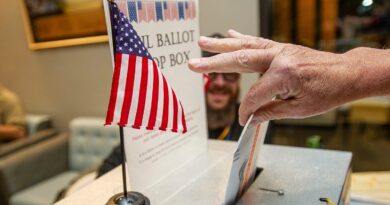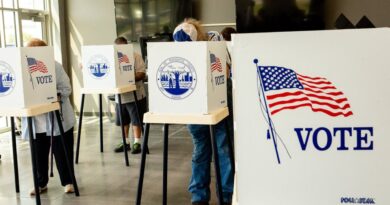Sen. Ted Cruz ’92 alleges voter fraud shortly before mob attack on U.S. Capitol – The Daily Princetonian
On Jan. 6, Sen. Ted Cruz ’92 (R-Texas) formally objected to the certification of Arizona’s Electoral College vote count. Soon after, a mob supportive of President Donald Trump attacked the U.S. Capitol Building, leading to a lockdown and disrupting Congress’s eventual confirmation of President-elect Joe Biden’s win.
Five people present died during or soon after the attack, with dozens of police officers injured. As of reporting, one police officer has since died from injuries sustained during the attack.
ADVERTISEMENT
Many in the Princeton community condemned the events of the day, including University President Christopher L. Eisgruber ’83. On his personal blog, Eisgruber wrote “Every leader has a responsibility to oppose it [violence] and never to stoke or encourage it.”
Still, Eisgruber’s comments were limited primarily to the violent display at the Capitol and made no mention of Cruz or any other specific lawmakers. Multiple other community members, alumni, and lawmakers, however, criticized Cruz directly — some asserting the Senator incited the attack.
Though Cruz also condemned the violence, his remarks questioning the integrity of the election before the riot were widely criticized — with multiple lawmakers accusing Cruz of inciting the attack and calling for his resignation.
In a joint statement from 10 Republican senators published earlier this week, Cruz announced plans to object to individual states’ electoral results. Citing debunked “allegations of voter fraud, violations and lax enforcement of election law, and other voting irregularities,” the senators, alongside more than 100 Republicans representatives, were expected to contest votes from six battleground states won by the Biden-Harris ticket.
Cruz defended his objection during debate on the Senate floor.
“Tens of millions of Americans will see a vote against the objection,” he said, “as a statement that voter fraud doesn’t matter, isn’t real, and shouldn’t be taken seriously.”
ADVERTISEMENT
He then cited the Election of 1876 as precedent to conduct a 10-day emergency audit of election returns. The comparison’s relevancy has been called into question by multiple sources. Namely, in the 1876 controversy, states had sent competing slates of electors and allegations of fraud had not been disproven in over fifty cases.
Cruz concluded by asking both Republicans and Democrats to “consider the claims, consider the facts, consider the evidence.”
Former U.S. Rep. and Democratic presidential contender Beto O’Rourke rebuked Cruz as rioters stormed the Capitol, characterizing Cruz’s earlier remarks as a “self serving attempt at sedition” leading to the afternoon’s violent dissent.

Responding to his 2018 Senate seat rival nearly half an hour later, Cruz classified O’Rourke’s language as “malicious rhetoric” which served to deepen the country’s divides.
At the time of publication, Cruz has not responded to a request for comment from The Daily Princetonian. His full statement on the events of Jan. 6th, issued early Thursday morning, noted that Americans “must come together and put this anger and division behind us.”
The statement called the attack a “despicable act of terrorism” and added that the Department of Justice should “vigorously” prosecute those involved. This language was noticeably absent from President Trump’s video message telling rioters to “go home.” Trump instead praised rioters in Tweets and Facebook posts on the day of the incident.
History professor Sean Wilentz, in an interview for NJ.com, discussed whether “real accountability” would be seen for President Trump’s encouragement of loyalist behavior.
“There are people who broke much bigger laws than the people who stormed the Capitol, and that includes the president of the United States,” he said.
George Will GS ’68, a conservative columnist, referred to Cruz, Trump, and Senator Josh Hawley (R-Mo.) as seditionists in a column on Wednesday as well.
“The Trump-Hawley-Cruz insurrection against constitutional government will be an indelible stain on the nation,” Will wrote.
Trump’s video and written statements on Wednesday led Twitter to temporarily suspend his account until twelve hours after the posts were deleted and Facebook to extend the block placed on his Instagram and Facebook accounts indefinitely. In a video message released earlier this evening, Trump did condemn the violence and told the country that there would be “a new administration” sworn in this month.
The Congressional joint-session to certify vote counts ended at 3:45 a.m., officially confirming Joe Biden and Kamala Harris as the 46th President and Vice President of the United States. Cruz reiterated that calling for an electoral commission was “the right thing to do,” but vowed to respect the opposition.
“I very much wish Congress had not set aside these concerns, but I respect the position each of my colleagues took,” Cruz added. “We must, and I am confident we will, have a peaceful and orderly transition of power, pursuant to the Constitution.”
Eisgruber’s response
University President Christopher L. Eisgruber ’83, in a President’s Blog post titled “The Constitution’s Promise,” emphasized the commitment needed from individuals to ensure peaceful discourse and transition.
“The Constitution permits us to address disagreements peacefully as we strive together for justice, prosperity, and a better future. It permits us to do so, however, only if we, the people of this country, have the strength and commitment to make real the Constitution’s promise,” he wrote.
“There is no place in a democracy for what transpired today in Washington,” Eisgruber continued. “Such lawless behavior is unacceptable and weakens our country. Every leader has a responsibility to oppose it and never to stoke or encourage it.”
Eisgruber also noted in that light of yesterday’s events, Americans could no longer take peaceful transitions for granted.
“I am saddened by what we saw today,” Eisgruber said. “But I am also confident that Americans can and will rise together to meet the challenges that the Constitution imposes upon us: to renew our commitment to the rule of law and to peaceful disagreement; to push always for justice, equality, liberty, and the ideals of a free nation … to redress this nation’s failures and build upon its achievements as we endeavor to become a more perfect Union.”
To achieve this growth, Eisgruber called the Princeton community to action: “We all have a role to play.”
Student Response
A tweet from Amanda Eisenhour ’21 questioning Princeton’s engagement with Cruz gained traction among students on Wednesday night.
Eisenhour explained to the ‘Prince’ that although “treason sounds like a buzzword,” when crafting her Tweet, treason was “very clearly what’s happening.”
“He is attacking the idea that elections can be decisive,” Eisenhour said. “There is a causal relationship between these calls, saying we don’t believe that this election is legitimate, and then enabling white supremacist, domestic terrorists to take over the Capitol … and Cruz has fomented that by actually saying he does not believe in the procedures laid out by the Constitution to enable the continuance of democracy.”
“Princeton claims to [be in the nation’s service], but then also has brought in people, under the guise of intellectual diversity, who now are very clearly in violation of the first half of the motto,” she added.
Matthew Wilson ’24, chair of the Whig-Cliosophic Society’s right-leaning Clio-party, noted that he had “a lot of respect for Senator Cruz” and said Cruz was “right to say that tens of millions of Americans don’t have confidence in how the 2020 presidential election was conducted.” Still, he disagreed with the manner in which Cruz said it.
“Attempting to have Congress throw out legally-cast Electoral College votes at the last minute is not and was never the appropriate remedy to this,” Wilson said.
Wilson added that he “wholeheartedly agree[s]” with the recent Washington Post op-ed of another Republican Princeton alumnus, Ken Buck ’81 (R-Colo.). In the op-ed, Buck described how the “current ploy by [his] Republican colleagues to challenge the electors” violated federalism and played into progressive arguments for abolishing the Electoral College due to voter disenfranchisement.
Reflecting on Cruz’s legacy in an interview to the ‘Prince’, Texas resident Kesavan Srivilliputhur ’23 discussed how Cruz’s reputation as an “intellectual conservative” allowed his objections to give legitimacy to Trump’s election fraud claims.
“He’s clearly just doing it to further his own political career,” Srivilliputhur said. “I was looking at his tweets; he’s been trying to sound like he’s some sort of reasonable guy in raising these objections. But he’s really not.”
“And I think history tends to have unfavorable eyes on people who act in these kinds of seditious ways,” he added.
*** This article has been archived for your research. The original version from Google News can be found here ***


